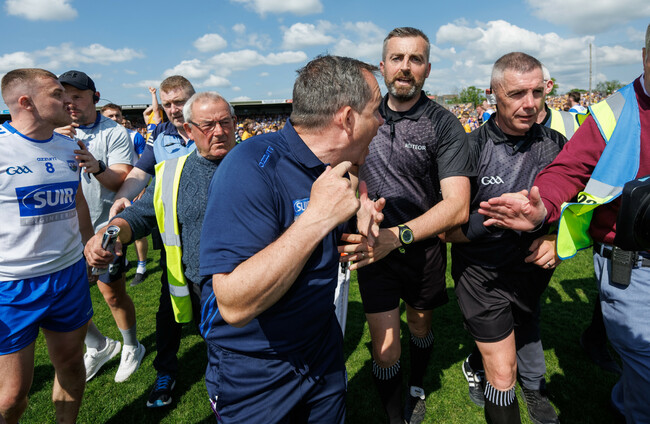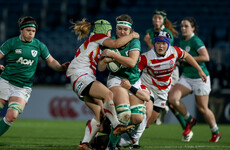NO PICTURE CAN TRULY become the entirety of evidence when it comes to the ruling made by referee Liam Gordon’s umpire in the closing moments of the Munster hurling round robin game between Waterford and Clare.
The umpire ruled that the sliotar came off Waterford full-back Mark Fitzgerald. He took his time though and ambled out to the spot the ball exited play, before semi-hesitantly raising his arm for a 65.
It was subsequently nailed by Clare’s Mark Rodgers, who placed the ball noticeably closer to goal than the actual 65 metre mark.
Given that the successful strike put Clare back in the lead and there wasn’t even time for the puck-out, it had the potential to be one of the most significant decisions of the hurling season.
As it is, the narrative at present is that the umpire guessed it. But he guessed right.
It still did not stop Waterford manager Davy Fitzgerald remonstrating in aggressive fashion with the referee as he came off the pitch, before Clare mentor Tommy Corbett got caught up in the mix.
For the Chairperson of the National GAA Referees Development Committee, Jack Devaney, the area of training umpires and of respecting officials are two areas he is keen to examine in his committee, which was only recently ratified.
“We haven’t got round to it, but it would be (a priority) for me,” Devaney told The 42.
“And that’s a bigger task. Because, you are dealing with things that you don’t have control of, naturally.
“You are dealing with something in the culture and maybe a long-standing culture, that you are trying to go about changing.
“I do think in some respects, the rule changes, the heftier penalties that were brought in last year, even those at club level have helped a bit.
“But the whole issue of and around respect for referees is still one that stands out for me. We still haven’t come close to getting that right as an organisation. It’s a very difficult one to get right.”
He continued, “People point to other sports and ask, why are our players not able to respect the referee a little bit more.
“But that culture within, that’s long-standing. So trying to change something like this is going to be difficult and will take time.
“There’s a sense of entitlement nearly, with a lot of people in the GAA. They think they are entitled to do this, to berate the referee. They might think it’s part of who and what we are. But it certainly is not.”
Devaney revealed that one area he is keen to look at is just how much training umpires get and how they can assist a referee in matches.
One area that frustrates spectators is how inside forwards can be held off the ball and some umpires appear to be impassive towards it.
“It is on our radar to look at all of this. Because we have to ensure that when it comes to championship that referee’s umpires are strong. So we have to monitor that as well, yo make sure that there are no real weaknesses,” said Devaney.
“Referees usually bring umpires that they are comfortable with. That doesn’t always translate into as strong as possible a team that he or she could put their hands on.
“Some pick teams of umpires from people who have been with a referee that was on the championship panel and who have moved on. So you can have some very experienced umpires.”
Like all the other committees established under the new GAA President Jarlath Burns, Devaney’s committee was only ratified by Central Council in March, so they found they were launched straight into a championship season.
What changes they might be able to bring, will happen in the close season, as there are always matters overtaking them in the meantime.
One area they will focus on is the level of training all match officials receive.
“We have a number of workgroups looking at different areas and training would be one of them,” he said.
“Training is not only about the referee and the referee in championship. It’s about match officials broadly, looking at what we can lay out and what we can recommend that goes beyond intercounty, that comes back into the county and down to clubs as well.”
He is aware that this might represent a bridge too far for some umpires, who might baulk at a notable time commitment.
“Championship referees are a different body of people in that they know the expectation is there and they regularly have seminars even throughout the championship. Every few weeks they would meet up, be it online or in person to do a lot of stuff,” explains Devaney.
“You take the umpire, who is essentially a volunteer to the referee in a lot of cases, we are just going to have to strike the balance there. You don’t want to put people off by the notion of them having to go through significant training.”












What a left hook
@Joe Bloggs: what a chin
I watched this live. The punch from Uzcategui was after the bell. Dirrell himself showed allot class and sportsmanship, approaching Uzcategui to say he forgave him. Unfortunately the same can’t be said for Dirrell’s corner. They started a fight at ringside and then when they eventually got in the ring Dirrell’s uncle carried out this cowardly attack on Uzcategui.
Hopefully he was arrested immediate after and charged with assault.
@SYM-Metal: UPDATE: There is an official police report filed. Mr Leon Lawson is wanted on 2 counts of assault in the 1st and 2nd degree,by the state of Maryland.
Mr Lawson was not arrested at the scene and is still at large. He faces a sentence of up to 10 years in prison.
@SYM-Metal: The bell went when he was swinging. Fair enough it did connect after which is illegal but I don’t think it was 100% intentional.
As for Andre Dirrell, the guy has absolutely no balls whatsoever. It’s sickening how much of a quitter he is. Absolute play acting pretending he couldn’t continue as he knew he had a chance of a DQ win if he quit, it wasn’t as if he was caught with a sucker punch, they were still fighting. He was even getting up and decided to go back down. I would have given him the benefit of the doubt had he not done something similar against Arthur Abraham.
As for his uncle that was despicable, kind of funny I can’t lie, but horrible.
@SYM-Metal: I thought it was marginal if it was late. I think the refs positioning was poor in that situation with dirrell being backed in the corner and uzcategui letting his hands go with the round almost over the ref should have been right on the action,instead of a few yards away. A fighter in the mode of a combo is unlikely to just be able tot stop it when he is already in motion, talking about milliseconds in this instance.
@Seamus Cummins: you could hear Dirrell’s corner telling him to stay down
DJ Khaled should have done more to prevent that
Classy stuff.
Uncle Bam
Poor Dirrell can never catch a break.
@Leon: I think he’s the one catching the breaks and making the most of them.